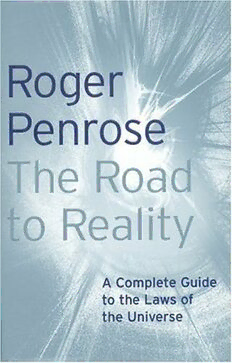
Road to Reality PDF
Preview Road to Reality
THE ROAD TO REALITY BY ROGER PENROSE TheEmperor’sNewMind: ConcerningComputers,Minds, andtheLawsofPhysics ShadowsoftheMind: ASearchfortheMissingScience ofConsciousness Roger Penrose T R HE OAD TO R EALITY A Complete Guide to the Laws of the Universe JONATHAN CAPE LONDON PublishedbyJonathanCape2004 2 4 6 8 10 9 7 5 31 Copyright(cid:1)RogerPenrose2004 RogerPenrosehasassertedhisrightundertheCopyright,Designs andPatentsAct1988tobeidentifiedastheauthorofthiswork Thisbookissoldsubjecttotheconditionthatitshallnot, bywayoftradeorotherwise,belent,resold,hiredout, orotherwisecirculatedwithoutthepublisher’sprior consentinanyformofbindingorcoverotherthanthat inwhichitispublishedandwithoutasimilarcondition includingthisconditionbeingimposedonthe subsequentpurchaser FirstpublishedinGreatBritainin2004by JonathanCape RandomHouse,20VauxhallBridgeRoad, LondonSW1V2SA RandomHouseAustralia(Pty)Limited 20AlfredStreet,MilsonsPoint,Sydney, NewSouthWales2061,Australia RandomHouseNewZealandLimited 18PolandRoad,Glenfield, Auckland10,NewZealand RandomHouseSouthAfrica(Pty)Limited Endulini,5AJubileeRoad,Parktown2193,SouthAfrica TheRandomHouseGroupLimitedReg.No.954009 www.randomhouse.co.uk ACIPcataloguerecordforthisbook isavailablefromtheBritishLibrary ISBN0–224–04447–8 PapersusedbyTheRandomHouseGroupLimitedarenatural, recyclableproductsmadefromwoodgrowninsustainableforests; themanufacturingprocessesconformtotheenvironmental regulationsofthecountryoforigin PrintedandboundinGreatBritainby WilliamClowes,Beccles,Suffolk Contents Preface xv Acknowledgements xxiii Notation xxvi Prologue 1 1 The roots of science 7 1.1 Thequestfortheforcesthatshapetheworld 7 1.2 Mathematicaltruth 9 1.3 IsPlato’smathematicalworld‘real’? 12 1.4 Threeworldsandthreedeepmysteries 17 1.5 TheGood,theTrue,andtheBeautiful 22 2 An ancient theorem and a modern question 25 2.1 ThePythagoreantheorem 25 2.2 Euclid’spostulates 28 2.3 Similar-areasproofofthePythagoreantheorem 31 2.4 Hyperbolicgeometry:conformalpicture 33 2.5 Otherrepresentationsofhyperbolicgeometry 37 2.6 Historicalaspectsofhyperbolicgeometry 42 2.7 Relationtophysicalspace 46 3 Kinds of number in the physical world 51 3.1 APythagoreancatastrophe? 51 3.2 Thereal-numbersystem 54 3.3 Realnumbersinthephysicalworld 59 3.4 Donaturalnumbersneedthephysicalworld? 63 3.5 Discretenumbersinthephysicalworld 65 4 Magical complex numbers 71 4.1 Themagicnumber‘i’ 71 4.2 Solvingequationswithcomplexnumbers 74 v Contents 4.3 Convergenceofpowerseries 76 4.4 CasparWessel’scomplexplane 81 4.5 HowtoconstructtheMandelbrotset 83 5 Geometry of logarithms, powers, and roots 86 5.1 Geometryofcomplexalgebra 86 5.2 Theideaofthecomplexlogarithm 90 5.3 Multiplevaluedness,naturallogarithms 92 5.4 Complexpowers 96 5.5 Somerelationstomodernparticlephysics 100 6 Real-number calculus 103 6.1 Whatmakesanhonestfunction? 103 6.2 Slopesoffunctions 105 6.3 Higherderivatives;C1-smoothfunctions 107 6.4 The‘Eulerian’notionofafunction? 112 6.5 TherulesofdiVerentiation 114 6.6 Integration 116 7 Complex-number calculus 122 7.1 Complexsmoothness;holomorphicfunctions 122 7.2 Contourintegration 123 7.3 Powerseriesfromcomplexsmoothness 127 7.4 Analyticcontinuation 129 8 Riemann surfaces and complex mappings 135 8.1 TheideaofaRiemannsurface 135 8.2 Conformalmappings 138 8.3 TheRiemannsphere 142 8.4 ThegenusofacompactRiemannsurface 145 8.5 TheRiemannmappingtheorem 148 9 Fourier decomposition and hyperfunctions 153 9.1 Fourierseries 153 9.2 Functionsonacircle 157 9.3 FrequencysplittingontheRiemannsphere 161 9.4 TheFouriertransform 164 9.5 FrequencysplittingfromtheFouriertransform 166 9.6 Whatkindoffunctionisappropriate? 168 9.7 Hyperfunctions 172 vi Contents 10 Surfaces 179 10.1 Complexdimensionsandrealdimensions 179 10.2 Smoothness,partialderivatives 181 10.3 VectorWeldsand1-forms 185 10.4 Components,scalarproducts 190 10.5 TheCauchy–Riemannequations 193 11 Hypercomplex numbers 198 11.1 Thealgebraofquaternions 198 11.2 Thephysicalroleofquaternions? 200 11.3 Geometryofquaternions 203 11.4 Howtocomposerotations 206 11.5 CliVordalgebras 208 11.6 Grassmannalgebras 211 12 Manifolds of n dimensions 217 12.1 Whystudyhigher-dimensionalmanifolds? 217 12.2 Manifoldsandcoordinatepatches 221 12.3 Scalars,vectors,andcovectors 223 12.4 Grassmannproducts 227 12.5 Integralsofforms 229 12.6 Exteriorderivative 231 12.7 Volumeelement;summationconvention 237 12.8 Tensors;abstract-indexanddiagrammaticnotation 239 12.9 Complexmanifolds 243 13 Symmetry groups 247 13.1 Groupsoftransformations 247 13.2 Subgroupsandsimplegroups 250 13.3 Lineartransformationsandmatrices 254 13.4 Determinantsandtraces 260 13.5 Eigenvaluesandeigenvectors 263 13.6 RepresentationtheoryandLiealgebras 266 13.7 Tensorrepresentationspaces;reducibility 270 13.8 Orthogonalgroups 275 13.9 Unitarygroups 281 13.10 Symplecticgroups 286 14 Calculus on manifolds 292 14.1 DiVerentiationonamanifold? 292 14.2 Paralleltransport 294 14.3 Covariantderivative 298 14.4 Curvatureandtorsion 301 vii Contents 14.5 Geodesics,parallelograms,andcurvature 303 14.6 Liederivative 309 14.7 Whatametriccandoforyou 317 14.8 Symplecticmanifolds 321 15 Fibre bundles and gauge connections 325 15.1 SomephysicalmotivationsforWbrebundles 325 15.2 Themathematicalideaofabundle 328 15.3 Cross-sectionsofbundles 331 15.4 TheCliVordbundle 334 15.5 Complexvectorbundles,(co)tangentbundles 338 15.6 Projectivespaces 341 15.7 Non-trivialityinabundleconnection 345 15.8 Bundlecurvature 349 16 The ladder of inWnity 357 16.1 FiniteWelds 357 16.2 AWniteorinWnitegeometryforphysics? 359 16.3 DiVerentsizesofinWnity 364 16.4 Cantor’sdiagonalslash 367 16.5 Puzzlesinthefoundationsofmathematics 371 16.6 TuringmachinesandGo¨del’stheorem 374 16.7 SizesofinWnityinphysics 378 17 Spacetime 383 17.1 ThespacetimeofAristotelianphysics 383 17.2 SpacetimeforGalileanrelativity 385 17.3 Newtoniandynamicsinspacetimeterms 388 17.4 Theprincipleofequivalence 390 17.5 Cartan’s‘Newtonianspacetime’ 394 17.6 TheWxedWnitespeedoflight 399 17.7 Lightcones 401 17.8 Theabandonmentofabsolutetime 404 17.9 ThespacetimeforEinstein’sgeneralrelativity 408 18 Minkowskian geometry 412 18.1 EuclideanandMinkowskian4-space 412 18.2 ThesymmetrygroupsofMinkowskispace 415 18.3 Lorentzianorthogonality;the‘clockparadox’ 417 18.4 HyperbolicgeometryinMinkowskispace 422 18.5 ThecelestialsphereasaRiemannsphere 428 18.6 Newtonianenergyand(angular)momentum 431 18.7 Relativisticenergyand(angular)momentum 434 viii Contents 19 The classical Welds of Maxwell and Einstein 440 19.1 EvolutionawayfromNewtoniandynamics 440 19.2 Maxwell’selectromagnetictheory 442 19.3 ConservationandXuxlawsinMaxwelltheory 446 19.4 TheMaxwellWeldasgaugecurvature 449 19.5 Theenergy–momentumtensor 455 19.6 Einstein’sWeldequation 458 19.7 Furtherissues:cosmologicalconstant;Weyltensor 462 19.8 GravitationalWeldenergy 464 20 Lagrangians and Hamiltonians 471 20.1 ThemagicalLagrangianformalism 471 20.2 ThemoresymmetricalHamiltonianpicture 475 20.3 Smalloscillations 478 20.4 Hamiltoniandynamicsassymplecticgeometry 483 20.5 LagrangiantreatmentofWelds 486 20.6 HowLagrangiansdrivemoderntheory 489 21 The quantum particle 493 21.1 Non-commutingvariables 493 21.2 QuantumHamiltonians 496 21.3 Schro¨dinger’sequation 498 21.4 Quantumtheory’sexperimentalbackground 500 21.5 Understandingwave–particleduality 505 21.6 Whatisquantum‘reality’? 507 21.7 The‘holistic’natureofawavefunction 511 21.8 Themysterious‘quantumjumps’ 516 21.9 Probabilitydistributioninawavefunction 517 21.10 Positionstates 520 21.11 Momentum-spacedescription 521 22 Quantum algebra, geometry, and spin 527 22.1 ThequantumproceduresUandR 527 22.2 ThelinearityofUanditsproblemsforR 530 22.3 Unitarystructure,Hilbertspace,Diracnotation 533 22.4 Unitaryevolution:Schro¨dingerandHeisenberg 535 22.5 Quantum‘observables’ 538 22.6 yes/nomeasurements;projectors 542 22.7 Nullmeasurements;helicity 544 22.8 Spinandspinors 549 22.9 TheRiemannsphereoftwo-statesystems 553 22.10 Higherspin:Majoranapicture 559 22.11 Sphericalharmonics 562 ix
